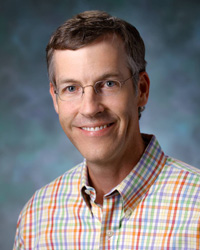Espenshade’s work called ‘brilliantly conceived and flawlessly executed’
The æ´∆∑π˙≤˙“ª«¯∂˛«¯Ã“…´ has named , associate professor of cell biology at Johns Hopkins University, the winner of the society’s .

Peter Espenshade
About the award
The Avanti Young Investigator Award in Lipid Research, established by ASBMB’s Lipid Research Division, recognizes outstanding research contributions in the area of lipids by young investigators with no more than 15 years of experience since receiving their degrees (Ph.D. or M.D.). The award consists of a plaque, $2,000, and transportation and expenses to present a lecture at the 2012 ASBMB annual meeting.
According to Peter Devreotes from Johns Hopkins University, the implications of Espenshade’s work are “critical to research into the nature and prevention of cardiovascular disease and stroke.” Moreover, his multifaceted research on how cells regulate both oxygen levels and production of cholesterol “for the first time united the fields of sterol synthesis and oxygen regulation,” said Nobel laureate Michael Brown, with whom Espenshade trained as a postdoctoral fellow. “His work is original, brilliantly conceived and flawlessly executed.”
Randy Hampton, professor of biology at the University of California, San Diego, agreed. “Espenshade has an incredible sense of where to look to find really fascinating and important things – and what to do to turn them into great stories and lines of inquiry.”
After graduating summa cum laude from Princeton University, Espenshade completed his Ph.D. in biology at the Massachusetts Institute of Technology in 1997. During his postdoctoral fellowship with Brown and fellow Nobel laureate Joseph Goldstein at the University of Texas Southwestern Medical Center at Dallas, Espenshade used mammalian cell systems to decipher pathways involved in environmental sensing, in particular focusing on cholesterol homeostasis.
In 2003, he moved to his current position at Johns Hopkins, where he expanded his research to incorporate the fission yeast Schizosaccharomyces pombe as a model system. Espenshade’s ability to “exploit the strengths of both fungal and mammalian model systems to make paradigm-shifting discoveries” led Devreotes to nominate Espenshade for the award. “I have no doubt that his future achievements will be even more prominent.”
Espenshade will receive his award during the Experimental Biology 2012 conference in San Diego, where he will deliver an award lecture. The presentation will take place at 9:55 a.m. April 23 in the San Diego Convention Center.
Enjoy reading ASBMB Today?
Become a member to receive the print edition four times a year and the digital edition monthly.
Learn moreGet the latest from ASBMB Today
Enter your email address, and we’ll send you a weekly email with recent articles, interviews and more.
Latest in People
People highlights or most popular articles

In memoriam: Michael J. Chamberlin
He discovered RNA polymerase and was an ASBMB member for nearly 60 years.

Building the blueprint to block HIV
Wesley Sundquist will present his work on the HIV capsid and revolutionary drug, Lenacapavir, at the ASBMB Annual Meeting, March 7–10, in Maryland.

In memoriam: Alan G. Goodridge
He made pioneering discoveries on lipid metabolism and was an ASBMB member since 1971.

Alrubaye wins research and teaching awards
He was honored at the NACTA 2025 conference for the Educator Award and at the U of A State and National Awards reception for the Faculty Gold Medal.

Designing life’s building blocks with AI
Tanja Kortemme, a professor at the University of California, San Francisco, will discuss her research using computational biology to engineer proteins at the 2026 ASBMB Annual Meeting.

Jordahl named Gilliam Fellow
He will receive three years of funding to support his thesis research.

